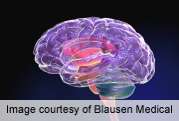Brain activity linked to TNF inhibitor response in RA

(HealthDay)—Patients with rheumatoid arthritis who respond to tumor necrosis factor inhibitors (TNFi) show changes in activity in pain-related areas of the brain before clinical signs of improvement are observed, according to a study published in the February issue of Arthritis & Rheumatism.
Juergen Rech, M.D., from the University of Erlangen-Nuremberg in Germany, and colleagues performed functional magnetic resonance imaging (MRI) of the brain and anatomic MRI of the hand in 10 patients with active rheumatoid arthritis before and up to 28 days after starting treatment with TNFi.
The researchers found that patients who responded to TNFi had a greater mean decrease in Disease Activity Score in 28 joints 28 days after starting treatment. Responders had greater activation of the thalamic, limbic, and associative areas of the brain, which decreased within three days of starting treatment. This was followed by clinical responses after seven days and responses on the hand MRI 28 days after starting treatment.
"These data suggest that response to TNFi depends on brain activity in rheumatoid arthritis patients, reflecting the subjective perception of disease," Rech and colleagues conclude.
One author disclosed receiving speaking fees from several pharmaceutical companies.
More information:
Abstract
Full Text (subscription or payment may be required)
Health News
Copyright © 2013

















